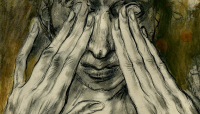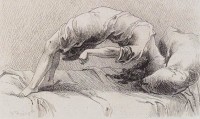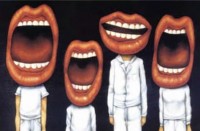A/cephalic Discontents: Group Psychology, The Absence of Myth, and The Knot of Acephale
Scott Jenkins’ Notes on A/cephalic Discontents: Session I: There is a kind of nudity in anonymity, at least as much as there is a mask. The particular pleasure of the discussion: despite its intimacy, nobody in the room was familiar, on terms other than the texts, with more than a handful of others. ◊◊ In addition to those who begin at the beginning, and those who begin at “In the Beginning…”, there was also a royal figure according to whom you begin at the beginning, and go on til you come to the end, then stop. You can stop it with a cut or a plug. Or a question, which is neither, but is how the first session of acephalic discontents concluded at the place where, really, it begins. The question, from A: What is the strategy of acephale? Why Bataille’s project of acephale, the figur...Read More
Guilherme Massara Rocha: The Secret of Her Eyes – Necessity and Contingency in a Fragment of a Psychoanalytic Treatment
When we lose the eye as the phallus that guarantees the consistency of the visual, the blindness that ensues is not simply a non-signifying darkness, but rather an ‘undifferentiated palate of images.’ The event of an ocular castration gives way to a seething imaginary without the security of a local iconography, and in the desperate attempt to arrest this imaginary deluge a ‘volcanic hunger’ is invoked for the final form of the dead body. In facing the faceless terror of a treacherous cadaver that violently sees me, a transformation can begin to unfold whereby the punishing gaze of the absolute other gives way to the voice of an other who asks ‘what do you want?’, and finally to a desire that neither sees nor is seen, that is free to touch the limit of the visual in a place where nobody is...Read More
Freud as a Thinker of the Political Body: Fear and Distress as Political Affects – Vladimir Safatle in Conversation with Marcus Coelen
“For Freud distress is a prerequisite for social emancipation, not an experience of resignation or vulnerability, a demand for care by proto-parental figures, or a continued political experience of exploitation of fear. What we have in Freud the affirmation of distress as an ontological insecurity with the political function of reducing demand for an authority based on the phantasmagoric constitution of sovereign power. All political action is initially the action of a landslide and only distressed people are able to act politically. Freud shows us how a truly emancipatory politics is based on the affective circulation of experiences of distress, not on building fantasies to defend ourselves against it. In this sense, politics can be thought as a practice that allows distress to appe...Read More
Institute No Institute
Becoming a psychoanalyst is founded upon a subjective transformation that occurs in a personal analysis. It cannot be measured or predicted, yet it is the necessary factor that allows one to conduct analytic treatment. Neither the analyst alone nor a group of independent observers can determine its occurrence, but somehow together they may. That something so difficult to determine lies at the heart of professional transmission has troubled the field of psychoanalysis from its inception. Institutes, schools, and broader communities of psychoanalysts have struggled to harness this transformation to formal models of training. They have invariably encountered obstacles in the structures of authority and the exercise of power. While training outside institutions is not explicitly subject to the...Read More
Jamieson Webster: “Sick Bodies, Hysterical Pregnancies, ISIS Wives”
“Conversion is linked to combustible effects, to desires and fears that remain hidden, unspoken, but ripe, a demand that takes place through the body. This is certainly the situation with the original “conversion hysterics” of psychoanalysis. “I have a sounding board in my abdomen…if anything happens, it starts up my old pain,” said a woman to Breur in Studies in Hysteria (1895, p. 204). Some thirty-odd pages later, Freud takes over, as he would do, this hysteric’s imagery as his own, laying down the foundation for the existence of “unconscious ideas” and the “splitting” of the mind on the basis of her words. Freud writes, “the lively affects into which they are thrown by relatively trivial causes become more intelligible if we reflect that the ‘split-off’ mind acts like a sounding-b...Read More
Tracy Morgan: “To Disembark”
“The denouement of a ten-year psychoanalytic treatment brings to mind the story of Jane Eyre. I was seven years deep into my analysis when I began to have the feeling that, like Jane’s blinded Mr. Rochester, my analyst had lost sight of me. From the precise moment I met Jane, and I can still see her seated in a dark room surrounded by a family not her own, she became a dear companion. Reading this novel in childhood, I was unable to set it down. As I walked to school, took a bath, ate dinner, I read. So intent was I on absorbing Bronte’s words, I parted with them only to sleep. Such was their elixir-like power over a seven year old me. Jane, “a motherless woman,” eventually makes her way as a governess. Late in the novel, and after much hesitation, she accepts the hand of her em...Read More
Interview with Patricia Gherovici: “The Unconscious is the Last Activist”
PATRICIA GHEROVICI: I was first a writer before I became an analyst. I was working as a journalist while I was a student and I did a lot of journalistic writing. There was a continuation of that early career in my practice of analysis. Indeed, the process of analysis could be seen as a process of writing, with the difference that the writing is made by the analysand. A successful analysis works like writing. In some cases, certain novelists use writing as an analysis. When an analysis functions successfully, something similar to what is at stake in writing has to have been produced, and in that sense they are perhaps an extension of each other. There is something that has to do with writing, inscription, and editing that takes place in analysis. They are parallel processes. CASSANDRA SELTM...Read More
Steven Reisner: Just One More Question – New York Times Couch
“Eventually, we came around to my problem, which, of course, had echoes of former problems of mine with which he was familiar. He listened closely and, after a pause, looked me squarely in the eye, and with a deep knowledge of me, said, “You will not be fully yourself until you are wholly aligned with your sexuality.” I tried to soften and generalize what he was saying to me: “You mean my life drive?” He shrugged as if to say, Eh, that’s not quite it. “No, not your life drive,” he said. “That’s not your problem. Your sexuality.” Martin’s generation of psychoanalysts had worked to tame sexuality, focusing instead on a more general need for relationships. This gentler version has become prominent in today’s psychoanalytic circles. But for Martin, this was only half the story. The other...Read More
Manifesto Fest in DIVISION/Review
A group, including many Unbehagen members, presented a Manifesto Fest at the 2015 Division 39 Spring meeting in San Francisco. Click here to read the manifestos of Will Braun, Jill Gentile, Lynne Layton, Tiffany McLain, Tracy Morgan, Jonathan Shedler, Esther Sperber & Robert Stolorow, published in DIVISION/Review (posted with permission from DIVISION/Review).
Without History: An Experimental Case Presentation
“For today’s event, we have asked our three analysts to present the same case, which is an ongoing psychoanalysis, being conducted by yet another clinician who’ll remain anonymous. Our three analysts will present this case based on a set of process notes only, without access to case history or other information about the case. Also, no one in today’s audience will have access either to the process notes or to any case history. This includes the event’s planners: neither I nor any member of the planning group has looked at the process notes, nor do we know details of the case. We’ve designed this event so that, aside from the three presenters, everyone else in the room will listen from a radical position of—“not knowing.” We’ve designed this event flexibly, with a number of possible d...Read More
Jamieson Webster: Speaking into the Void of the Unbehagen SalOon Listserv
DU tends to forget itself, which isn’t a bad thing. And the idea of DU, and its various allegiances, shift and grow and mutate which is a small miracle in often stuck communities. There are a lot of new people on the list serve, people who haven’t attended events, people who only know one another virtually, which is also a new situation. It is something of this new culture which I think creates tension on the list serve and a growing rhetoric of splitting- academic v clinical psychoanalysis, affects v language, interpretation v relationship, intellect v feeling, Lacan v everyone else. That’s fine. It’s an important stage. Personally, I think these are false divisions- in particular the academic v clinical psychoanalysis one, which I think tends to break things down ...Read More
Evan Malater & Cecilia Wu: Rumplefreudskin – The Fantasy of the Immortal Plaque
In a famous letter to his interlocutor Wilhelm Fliess, Freud imagined that the place where he had and decoded the Irma injection dream would be one day marked by a plaque. ” Do you suppose that one day a marble tablet will be placed on the house, inscribed with these words: ‘On July 24, 1895 the secret of dreams was revealed to Dr. Sigmd Freud.’ A few days ago, I was talking to Cecilia Wu of the plaque fantasy as an example of the brash confidence of the early Freud, only to have her tell me that the tone of the letter is hardly triumphant or brash. “What do you mean?,” I said. Cecilia pointed out that he goes on to write, “At this moment I see little prospect of it.” That is to say, he saw little prospect that his plaque fantasy would ever be anything bu...Read More























